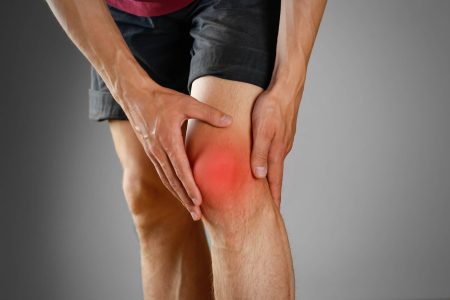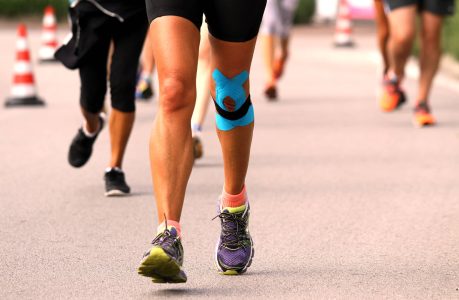KNEE PAIN SPECIALIST
About The Knee And How To Sustain Knee Health

The knee is one of the most crucial and complex joints in the human body. It serves as a pivotal connection between the thigh bone (femur) and the shin bone (tibia), allowing for essential movements like walking, running, and bending. However, due to its frequent usage and intricate structure, the knee is prone to various issues that can cause discomfort and hinder daily activities.
Common knee problems may include ligament injuries, such as ACL tears, meniscus tears, osteoarthritis, and patellofemoral pain syndrome. At our physical therapy center, we are dedicated to providing you with valuable insights and effective treatments to address these concerns and aid in your knee's rehabilitation. But remember, prevention is always better than cure! To sustain the health of your knees, it's essential to maintain a well-balanced exercise routine that focuses on strengthening the muscles around the knee joint. Low-impact activities like swimming, cycling, and targeted exercises can help improve knee stability and flexibility. Additionally, maintaining a healthy body weight will also reduce the stress on your knee joints, promoting overall joint health and longevity.
Take care of your knees, and they'll take care of you! If you experience any discomfort or have concerns about your knee's health, our expert physical therapists are here to guide you on your journey towards better knee function and an active lifestyle. Let's work together to keep your knees strong, mobile, and pain-free!
Common Causes of Knee Pain
The knee is a weight-bearing joint that undergoes significant stress during daily activities, making it susceptible to various painful conditions. Understanding these causes can empower you to seek timely treatment and preventive measures for optimal knee health.
Injuries and Trauma: Knee pain often stems from injuries, such as ligament tears (like the anterior cruciate ligament or ACL), meniscus tears, or sprains. Sports-related incidents, accidents, or sudden twisting movements can lead to these injuries, resulting in pain, swelling, and restricted movement.
Osteoarthritis: This degenerative joint condition is a common cause of knee pain, especially in older adults. Osteoarthritis occurs when the protective cartilage that cushions the knee joint wears down over time, leading to bone-on-bone friction, inflammation, and discomfort.
Overuse and Repetitive Stress: Engaging in repetitive movements or overusing the knee joint, such as in activities like running, jumping, or kneeling, can lead to conditions like patellofemoral pain syndrome (runner's knee) or tendonitis, causing persistent pain.
Bursitis: The knee has fluid-filled sacs called bursae that act as cushions between bones and soft tissues. When these bursae become inflamed due to overuse or constant pressure, it can result in knee pain and swelling.
Obesity: Excess body weight puts additional stress on the knee joints, increasing the risk of wear and tear and contributing to conditions like osteoarthritis.
Muscle Imbalances: Weak or tight muscles around the knee joint can disrupt its alignment and stability, leading to discomfort and potential injuries.
Remember, proper diagnosis by a qualified physical therapist is essential to pinpoint the exact cause of knee pain. With the right treatment plan and lifestyle adjustments, we can work together to alleviate pain, promote healing, and restore the health and functionality of your knees.
Home Remedies for Knee Pain

While it's essential to consult a qualified physical therapist for a personalized treatment plan, there are several home remedies and go-to stretches that can provide relief and aid in the recovery process.
Home Remedies: When experiencing knee pain, you can try the following home remedies to ease discomfort and promote healing. First, the R.I.C.E method – Rest, Ice, Compression, and Elevation – can help reduce inflammation and swelling. Gentle massaging with topical analgesics may also provide temporary relief. Applying heat packs can alleviate stiffness and promote blood flow. Additionally, over-the-counter pain relievers, when used according to the recommended dosage, may help manage mild knee pain. However, it's crucial to avoid self-medicating for prolonged periods and to consult a healthcare professional if the pain persists or worsens.
Go-To Stretches
Incorporating regular stretching exercises into your routine can improve knee flexibility and strength. Hamstring stretches, quadriceps stretches, and calf stretches are excellent options for maintaining knee mobility. The standing calf stretch, for instance, can be achieved by leaning against a wall with one leg extended backward and the other bent in front, ensuring the back heel is flat on the ground. Hold the stretch for about 30 seconds and repeat on the other side. Strengthening the surrounding muscles is equally important, and exercises like straight leg raises and mini-squats can help enhance knee stability. However, always perform these stretches with caution and stop if you experience pain or discomfort, as pushing too hard can aggravate the condition.
Remember, these home remedies and stretches are complementary to professional physical therapy, not a replacement. If you're experiencing persistent knee pain, our expert therapists are here to guide you through a tailored treatment plan to address the root cause and help you regain full knee function and comfort.
When To Seek Physical Therapy
Knowing when to seek professional help for your knee pain is crucial in ensuring timely and effective treatment. While some mild knee discomfort may improve with rest and self-care, certain signs and symptoms warrant a consultation with a qualified physical therapist for a comprehensive evaluation.
Persistent Pain: If you experience knee pain that persists for more than a few days, despite home remedies and rest, it's essential to seek professional help. Persistent pain could be an indication of an underlying issue that requires proper diagnosis and targeted treatment.
Swelling and Inflammation: Noticeable swelling around the knee joint, accompanied by redness and warmth, may suggest an inflammatory condition or an injury that requires expert attention.
Limited Range of Motion: If you find it challenging to fully extend or bend your knee, or if you experience a feeling of joint stiffness, it's advisable to consult a physical therapist who can assess your knee's mobility and identify any functional limitations.
Instability and Weakness: Frequent episodes of the knee "giving way" or feeling unstable, as well as a noticeable weakness in the joint or surrounding muscles, should not be ignored and necessitate professional evaluation.
Inability to Bear Weight: If you're unable to put weight on the affected knee or experience severe pain when attempting to do so, it's crucial to seek immediate medical attention to rule out significant injuries or fractures.
Impact on Daily Activities: If knee pain is interfering with your daily activities, such as walking, climbing stairs, or participating in your regular exercise routine, it's time to consult a physical therapist who can create a personalized treatment plan to address your specific needs.
Remember, early intervention and professional guidance can significantly improve the outcome and speed of recovery for knee pain. Our team of dedicated physical therapists is here to help you understand the root cause of your knee discomfort and provide targeted treatments to get you back on track to a pain-free and active lifestyle.
How Physical Therapy Helps With Knee Pain
Physical therapy plays a pivotal role in effectively managing and treating knee pain, helping individuals regain strength, mobility, and function. When you experience knee pain, a skilled physical therapist can create a tailored treatment plan to address the root cause of the issue, alleviating discomfort, and promoting optimal knee health.
Assessment and Diagnosis: A physical therapist will start with a thorough evaluation of your knee, including assessing your range of motion, strength, flexibility, and overall function. They'll also consider factors like your gait, posture, and movement patterns that could be contributing to your knee discomfort. This comprehensive assessment ensures that the treatment plan targets the specific needs and underlying causes of your pain.
Manual Therapy: Physical therapists often employ manual therapy techniques, like joint mobilization and soft tissue massage, to improve joint mobility, reduce pain, and promote healing.
Exercise Prescription: Targeted exercises play a crucial role in strengthening the muscles surrounding the knee joint, enhancing stability and reducing the risk of future injuries. A physical therapist will provide a personalized exercise program tailored to your needs, ensuring you regain strength and mobility without aggravating the condition.
Modalities: Physical therapists may use various modalities to aid in pain relief and recovery. These can include heat and cold therapy, ultrasound, electrical stimulation, and more, depending on your specific condition and needs.
Education: An essential aspect of physical therapy is educating patients about their condition, the importance of preventive measures, and how to maintain good knee health. A knowledgeable physical therapist can provide insights and guidance on correct exercise techniques, lifestyle modifications, and ergonomic adjustments to prevent future issues.
Functional Training: As you progress through your rehabilitation journey, physical therapists can also help retrain movement patterns, ensuring you return to your regular activities safely and effectively.
Remember, each individual's needs are unique, and a comprehensive physical therapy plan should cater to these specific requirements. By working closely with a skilled physical therapist, you can tap into their expertise to address the root cause of your knee pain, ensure a swift recovery, and pave the way for a future of optimal knee health and mobility.

